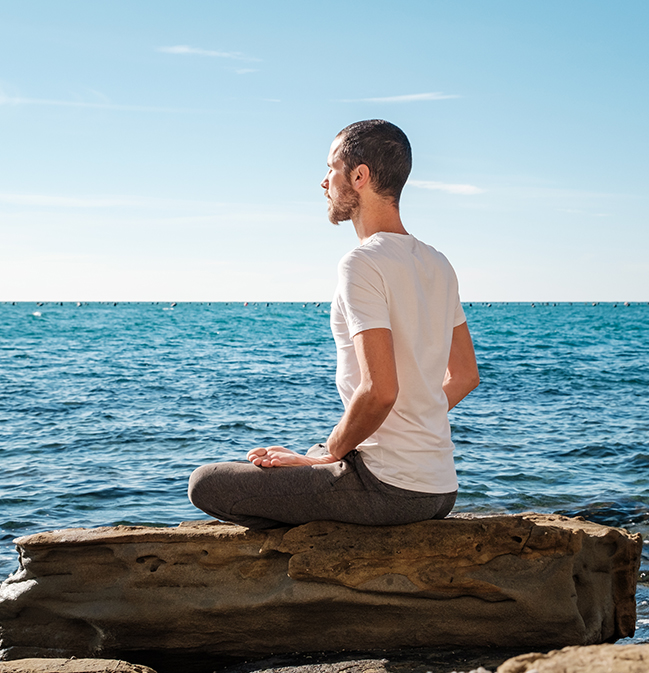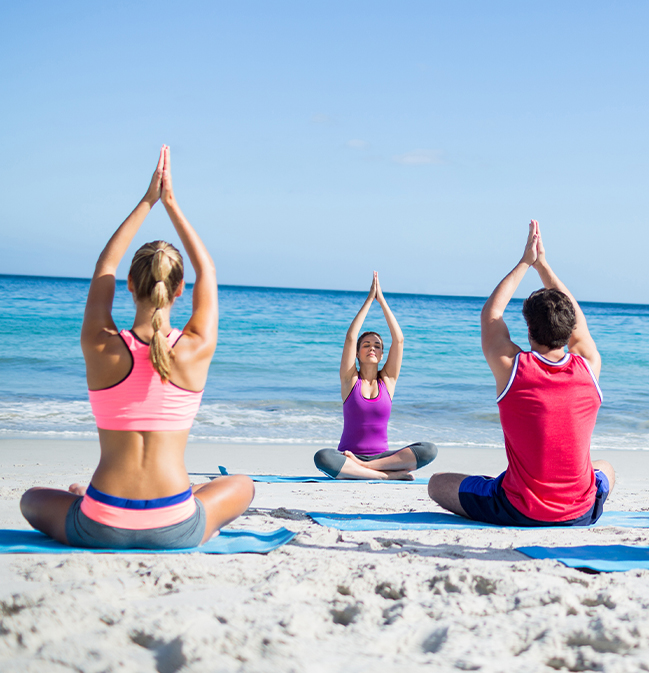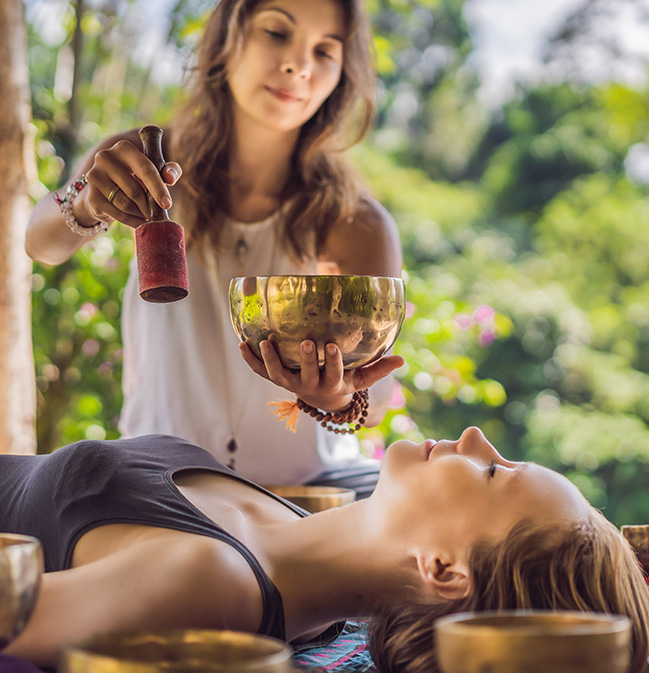
Home » Treatment Programs » Holistic Therapy
Holistic Rehab: Our Approach to Addiction Treatment
- Authored by Joe Gilmore
- Clinically Reviewed by Jenni Busse
- Last Updated 04/03/2024
- By Joe Gilmore
- Reviewed by Jenni Busse
- 04/03/2024

WHAT IS HOLISTIC REHAB?
Holistic rehab is an approach to healing what ails someone by addressing the entire person. It considers what the main illness or affliction may be, then also zeros in on other parts, including the mind, body, emotions, and spirit. In doing so, optimal health can be achieved by gaining a real balance among all areas of a person.
Practitioners of holistic medicine believe that if part of a person’s health is out of balance, it affects their entire being. For example, if a patient tells their doctor they are experiencing headaches, they may be told to take aspirin or other medications. While this may temporarily address the pain of a headache, the symptoms may return. Investigating what part of the person may be out of balance can help cure the headaches completely.
Maybe the patient is not consuming regular nutritional meals or not getting enough sleep. They might be under a lot of stress from a personal or job-related situation. They could be feeling the effects of a mood disorder, such as depression. Examining all areas of a patient’s life can help bring about multiple ways to address what otherwise seems like a singular problem. Gratitude Lodge offers several types of holistic rehab, drug, & alcohol treatment provided by our skilled, caring professionals. These choices include the following.
ART THERAPY
Art therapy is provided by a professional art therapist. It helps improve a person’s self-esteem and self-awareness. It also assists in promoting insight into conflicts and difficult emotions experienced by a patient. This can help reduce or resolve the situations and feelings that have troubled a person.
Art therapy incorporates creative outlets to help complement other types of therapy. This includes visual arts such as drawing, painting, sculpting, and collage. Often people find it difficult to openly discuss things like depression or traumatic events. Channeling their thoughts and feelings into artwork helps the therapist understand their patient.
A wide range of facilities and programs provide art therapy as part of their curriculum. Art therapy programs exist in private therapy, rehabilitation and mental health facilities, hospitals, and community clinics. Focused groups such as those found in schools, senior communities, and veteran groups also benefit from the healing effects of art therapy.


BREATHWORK
Breathwork involves using breathing exercises to help improve the physical, mental, and spiritual health of a person. The art of breathwork has origins in Eastern medicine while incorporating more modern Western practices.
Intentionally changing a person’s breathing pattern can bring about positive physiological and emotional changes. The act of focusing on breathing helps center a person’s mind. Many different types of breathwork exist, giving a practitioner choices to explore what best suits their patient.
Breathwork can assist in treating issues such as:
- ANXIETY
- DEPRESSION
- TRAUMA AND POST-TRAUMATIC STRESS DISORDER (PTSD)
- GRIEF AND LOSS
- ANGER
- CHRONIC PAIN
- EMOTIONAL EFFECTS OF ILLNESS
YOGA
Rooted in Indian philosophy, yoga enjoys great popularity in the United States. A recent survey showed that one in seven adults has practiced yoga in the past year. Yoga helps promote physical and mental well-being. It includes physical posturing, breathing techniques, and concentration. Some types of yoga focus on more gentle practices, while others provide a more physically demanding session.
Practicing yoga as holistic therapy helps promote strength, flexibility, and endurance. It also assists in developing calmness and a feeling of being centered. It can help relieve pain and reduce the symptoms of anxiety, stress, and depression.
Many addiction treatment programs offer yoga to help reintroduce patients to how their bodies feel. This can be quite eye-opening after they have spent a great deal of time physically numbed by drugs and alcohol.


SOUND BOWLS THERAPY
Sound therapy with singing bowls is an ancient form of holistic healing. The sound and vibrations from these unique instruments stimulates stress relief and helps naturally eliminate toxins from the body. They are also effective for easing emotional or mental issues, including worry, fear, anger, anxiety, low self-esteem, insomnia, and depression.
Sound bowls therapy is also proven to stabilize mental function and improve synaptic responses in the brain for clearer thinking and processing. The bowls may be placed on or around you during your therapy session to facilitate a calming, healing, and harmonious experience.
Sound bowls are often called “singing bowls” for their resonant, musical sound and for how the soothing, exotic sounds linger for a time after being played. Different versions of sound bowls are made from various materials and come in different sizes. There are Tibetan bowls, Japanese bowls, Nepalese bowls, Bengalese bowls, and even crystal bowls made of glass.
EXERCISE
Most people are familiar with hearing their doctor impress upon them the importance of exercise. This good advice applies to treatment for substance use disorders. A Harvard Medical School report stated that exercise, coupled with other treatments, can assist in helping with recovery from addiction.
Exercise as holistic therapy involves making the mind/body connection. A body that has been ravaged by long periods of drugs and alcohol abuse often needs an exercise program to help begin repairing it. Exercise helps improve a person’s mood. Mental health issues such as depression and anxiety often accompany addiction. This means that exercise can boost treatment success for both physical and emotional needs.


NUTRITION
When a person lives a life consumed by addiction to drugs and alcohol, their nutrition likely suffers. They often consume less food than needed and make poor choices when they do eat. Individuals struggling with addiction may lose nutrients through side effects of their disease, such as vomiting and diarrhea. This makes incorporating new healthy eating habits vital to recovery.
Many inpatient and residential treatment facilities and sober living houses include nutrition as part of their program. Residents benefit from learning to grocery shop and prepare delicious and nutritious meals. A body that can count on regular, healthy meals is better prepared to meet other addiction recovery goals.
WHAT ARE THE BENEFITS OF HOLISTIC THERAPY?
At Gratitude Lodge, holistic therapies are used in addition to evidence-based treatments for addictions and mental health disorders. If you are still unsure about the basics of holistic rehab, explore the most frequently asked questions that hit our inbox at Gratitude Lodge.
At Gratitude Lodge, our holistic rehab programs are delivered in a positive, supportive, and pet-friendly environment. Whether you engage with an inpatient or intensive outpatient treatment program, you can connect with a whole-body approach to recovery surrounded by others with similar goals and shared experiences of drug addiction or alcoholism.
As you move from the chaos of addiction with many relationships based on substance abuse into ongoing recovery, start forming a positive sober support system at Gratitude Lodge while benefiting from a variety of holistic treatment to supplement your individualized and science-backed treatment program.
From the challenges of detox through the intensity of ongoing treatment, your treatment team at Gratitude Lodge will support you in maintaining your recovery without relapsing.
Access some of the best medical professionals and addiction specialists in Southern California and engage with holistic treatments delivered by supportive and committed practitioners.
All staff at Gratitude Lodge are licensed, credentialed, and fully committed to your recovery. From therapists who can help you develop healthy coping techniques during sessions of CBT (cognitive behavioral therapy) to fitness and diet professionals who can help you strengthen your body and thrive in sober living, all staff excel in their fields.
By pursuing a holistic approach to addiction treatment and recovery at Gratitude Lodge, you can build the firmest foundation for recovery without relapse.
Addiction has high relapse rates similar to those of other chronic health conditions. As such, aftercare forms an integral part of your treatment plan, minimizing the chance of relapse derailing your recovery. At Gratitude Lodge, we are here to help you from detox to discharge and beyond.
Gratitude Lodge's Holistic Rehab
By pursuing a holistic approach to addiction treatment and recovery at Gratitude Lodge, you can build the firmest foundation for recovery without relapse.
Addiction has high relapse rates similar to those of other chronic health conditions. As such, aftercare forms an integral part of your treatment plan, minimizing the chance of relapse derailing your recovery. At Gratitude Lodge, we are here to help you from detox to discharge and beyond.

HOLISTIC REHAB & TREATMENT FAQS
Treating a patient holistically means addressing their physical, emotional, social, and spiritual needs as a whole person, instead of purely focusing on their symptoms or specific health conditions. The holistic approach recognizes that all aspects of a person’s life can impact their health and well-being and seeks to promote overall wellness and balance. Holistic healthcare practitioners may use a combination of conventional and complementary therapies, and may consider factors that include diet, exercise, stress levels, and environmental influences when developing treatment plans. By treating the whole person, rather than just the illness, patients may experience improved physical health, emotional well-being, and quality of life.
An example of a holistic approach to mental health is a treatment plan that addresses multiple factors that contribute to your mental well-being, rather than a treatment plan that focuses on the specific symptoms of a particular disorder. A holistic approach to treating depression might include therapy to help you develop coping skills and improve your relationships, as well as lifestyle changes like diet, exercise, and stress management techniques. Additionally, holistic mental health practitioners may use complementary therapies like acupuncture, massage, and meditation to address physical and emotional factors that contribute to your overall mental health. By engaging with a holistic approach to treatment, you may improve your overall well-being and potentially reduce the need for medications or other ongoing treatments.
A holistic treatment approach considers the whole person not just their specific symptoms or condition. This treatment approach addresses all aspects of well-being, including physical, emotional, social, and spiritual needs. Holistic treatments often combine conventional medicine with complementary and alternative therapies. The goal of holistic treatment is to improve overall health and well-being by addressing the root causes of the condition or imbalance, rather than focusing only on the symptoms. The holistic approach recognizes that the mind, body, and spirit are interconnected, and seeks to promote harmony and balance in all areas of life.
The holistic model of addiction views addiction as a complex condition that involves intertwined physical, psychological, social, and spiritual factors. This model recognizes that addiction is not just a behavioral problem or the result of individual weakness, but rather a symptom of deeper underlying issues like trauma, stress, or lack of purpose. The holistic model of addiction emphasizes the importance of treating the whole person, rather than just the addiction, and often includes a combination of conventional and complementary therapies, such as cognitive-behavioral therapy, mindfulness-based interventions, exercise, and relaxation techniques. The goal of the holistic model of addiction is to promote long-term recovery and improve overall well-being by addressing all areas of your life.
Holistic health is grounded on the belief that health and well-being are determined by the integration of physical, mental, emotional, social, and spiritual aspects of your life. The basics of holistic health include an understanding that the mind, body, and spirit are interconnected and influence each other. Holistic health involves a focus on prevention, using strategies like sound nutrition, regular exercise, stress management, and emotional wellness practices. Holistic health practitioners may also use complementary therapies like acupuncture, massage, and herbal remedies to support overall well-being. The goal of holistic health is to promote balance and harmony in all aspects of life to achieve optimal health and well-being.
Holistic recovery refers to a comprehensive approach to overcoming addiction or other mental health conditions that addresses all aspects of well-being, including physical, emotional, social, and spiritual needs. Holistic recovery recognizes that addiction is a complex condition with multiple underlying causes and aims to promote long-term recovery by addressing all areas of your life with a combination of conventional and complementary therapies. Holistic recovery also emphasizes the importance of a supportive sober community, including friends, family, and peers in recovery, to provide ongoing encouragement and accountability. The goal of holistic recovery is to help individuals achieve overall health and well-being in all areas of their lives.
Our Partners
WE ACCEPT MOST PPO INSURANCE
Drug and alcohol rehab should be accessible to everyone. At Gratitude Lodge,
we work with most insurance plans to cover the costs of treatment.

















